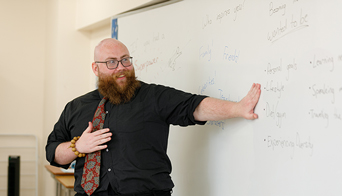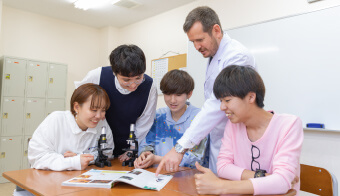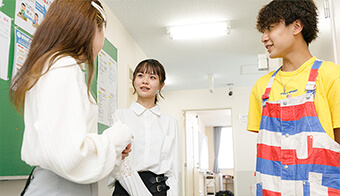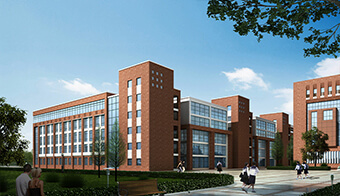ブログ
2016.09.03
高校生が応募できる英語コンテスト―自己表現の機会として活用しよう―

コミュニケーション能力が問われる現代社会。人の話を聞く力に加えて、自己発信力も大切です。英語で自己表現する機会として、多くの大学などで英語エッセーコンテストや英語スピーチコンテストを実施しています。学んでいる英語を試すチャンス。入賞すれば副賞として図書カードなどがついてくるものもあります。ぜひチャレンジしたいですね。
様々な団体がコンテストを実施しています
■関西学院大学
文科省よりスーパーグローバル大学として指定されている関西学院大学では、読売新聞・ジャパンタイムズとタイアップして「高校生英語エッセーコンテスト」を実施しています。メインテーマは「考えてみよう。世界のこと、日本のこと」。テーマに沿ったタイトルを考えて、300~400 words程度の英文にまとめて応募します。ホームページの応募方法のところに「英文エッセーの書き方」のページがあり、英文を書くときの文法上の注意点もまとめられています。英語を学習する者にとって有効な情報ですので、確認しておきたいですね。
なお、本校では数年前、捨て猫を拾った体験から動物の殺処分について書いた生徒が努力賞を受賞しました。ちなみに毎年同じテーマです。日頃から国際事象や社会問題に疑問や関心を持ち、問題意識を高めておくことが大切です。
■ブリガム・ヤング大学ハワイ校
ブリガム・ヤング大学ハワイ校では「全国高校生英語スピーチコンテスト」を実施しています。このコンテストでは字数は制限されていませんが、英語および日本語原稿に加えて4分以内の音声吹込みデータを送付しなければなりません。テーマは毎年、家族に関するもので、「家族の大切さについて」「家族の絆を強めることについて」などとなっています。個人的な体験を中心に話題を展開できるので比較的書きやすいテーマですが、個人的な体験や感動的な出来事を深く考えたり、当たり前に思える普段の生活への新鮮な気づきが問われます。もちろん英語表現力に加えて、発音やイントネーションも大切です。
■大阪国際大学・大阪国際短期大学部
今からでも応募できるコンテストとしては大阪国際大学・大阪国際短期大学部主催の「全国高校生英語スピーチコンテスト」があります。締め切りは10月7日消印有効です。テーマは「あなたはなぜ英語を勉強するのですか?(Why are you studying English?)」「日本の文化で特有なものは何ですか?(What is unique about Japanese culture?)」「海外から日本への観光客を増やすためにはどうしたらよいでしょうか?(How can we increase the number of tourists coming to Japan?)」の3つです。こちらは4分~5分のスピーチです。詳しくは大阪国際大学のホームページを確認下さい。
■IIBC(国際ビジネスコミュニケーション協会)
期限が迫っていますが、TOEICを実施しているIIBC(国際ビジネスコミュニケーション協会)も英語エッセイコンテストを行っています。テーマは「私を変えた身近な異文化体験」です。「異文化」と言うとつい外国人との出会いや海外体験を思い浮かべますが、「異文化」は外国や外国人のことだけを意味するわけではないと注記されていて、自分と異なる価値観を持つ「相手」は「異文化」と考えることができる、と記されています。とりわけ、同じ価値観や考え方を持つようにとのプレッシャーを感じさせる文化的背景をもつ日本人にとって考えさせられるテーマです。語数は501~700 wordsです。締め切りは9月7日ですが、こちらは音声に吹き込む必要がありません。まだ間に合いますので、チャレンジしてみては如何でしょうか。
かれこれ10年余り前になりますが、本校の女子生徒が朝日新聞社主催の英文エッセーコンテストで優秀賞に輝きました。彼女は、副賞でオーストラリア研修旅行がプレゼントされました。ボートピープルとしてベトナムから渡来した経験がある父のエピソードや個人的な体験から「日本の難民問題」について記しました。今日、シリアやヨーロッパの難民問題が注目されていますが、日本に住む外国人の中にも厳しい環境に置かれている人がいます。個人的体験を一般化し、社会問題として扱った彼女のエッセーを最後に掲載します。模範的な英文とは言えない箇所もあります。しかし、説得力のある英文です。英語エッセーを書く際に大切なことは、問題意識を喚起し、読み手の心に語りかけることです。英語エッセーを書く際の参考にできると思います。
教育主任 滝本武
What I’m Thinking Most About
What my family has experienced is very different to the experiences that my classmates’ families have had. My parents were “boat people” or refugees, they left Vietnam about 20 years ago with a very simple boat which didn’t even have an engine. People slept sitting up because there was no room to lie down. They first reached Hong Kong and lived in a refugee camp for a few years then they came to Japan.
They told me it was an unforgettable and terrible journey. Many Vietnamese boat people died of starvation and were murdered by pirates on sea and so many people are still missing.
When they arrived in Japan, the Japanese government put them into accommodation for a while. They studied Japanese and did some easy work there. It was there that my parents met each other. They got married and had babies in Japan. 16 years ago I was born in Kobe. I went to a normal kindergarten, public elementary school and junior high school, of course in Japan. That is why my mind is quite Japanese and my home country is absolutely Japan. I love this country and my Japanese friends so much.
But I am very disappointed with the Japanese government. I think they discriminate against refugees. My parents have lived in Japan 20 years already, but they still cannot have Japanese nationality or a franchise, and the Japanese government didn’t give us “chiikishinkoken” which an autonomy distributed free to Japanese citizens, instead of money. The Japanese government says that we’re outsiders so they won’t give it to us even though we paid tax properly.
My family has to have special travel documents instead of a passport, which is very useless. We must get a visa wherever we go, and I always feel uncomfortable when I go through the customs because the customs officer always says, “What is this? Where is your passport?” I am so jealous of my cousins who live in Canada, their parents were refugees but they have Canadian passports and they have never had refugee discrimination or feel uncomfortable when they go through the customs.
Not only Canada, but also Australia, France and the United States took in a large number of refugees. All these countries gave a new nationality and franchise to Vietnamese boat people, except unfortunately Japan won’t allow refugees to become Japanese citizens. I think that is one of the reasons that Japanese are famous as cold people in the world.
Another example of how I am discriminated against in Japan is, that some Japanese companies do not want to employ me for part-time jobs because they consider me a foreigner, this makes me very sad. They do not want non-Japanese employees even if we can speak and write Japanese well. One day I called a restaurant looking for part-timers, I told them I wanted to work there, then they asked my name, so I said “My name is Merry Le,” they said “Are you Japanese?.” I explained my parents are Vietnamese but I was born in Japan and I entered normal Japanese public school, but he said “I’m sorry we cannot employ a foreigner.” That isn’t the only time a company wouldn’t hire me because of the same reason. It’s extremely unfair and disappointing.
I don’t think I am Vietnamese at all, and I can say there is only one place that I can call home, Japan. But the Japanese government still says we are outsiders. I think the Japanese government needs to make changes in their policies about refugees. I would like the Japanese government to stop discriminating and rethink the refugee problem.
関西外語専門学校 国際高等課程 レ・メリー
彼女のエッセーは次のホームページに掲載されています。
「朝日ニッケ英文エッセーコンテスト~18年の軌跡~180の優秀作品」 2005年
↓本校HPはこちら

大阪のインターナショナルスクールなら
関西インターナショナルハイスクール
〒545-00053 大阪市阿倍野区松崎町2-9-36
帰国生・帰国子女受け入れ校
高校卒業資格(NHK学園高等学校との併修制度による)
タグ一覧
- AIG高校生外交官プログラム
- APU
- Australia
- BA.5
- Bournemouth
- CAE
- CEFR
- class
- English
- estar動詞
- FCE
- George Bernard Shaw
- graduation ceremony
- GTEC
- GUP
- Halloween
- HOMESTAY
- HSDJapan
- IELTS
- LESSON
- Listening
- Manual Rios
- MOJO
- MUN
- MySOS
- NISA
- OECD
- PCR検査
- SDGs
- Semana Santa
- ser動詞
- SNS
- Society3.0
- Society4.0
- Society5.0
- Speaking
- Speech Contest
- TCK
- Third Culture Kid
- TOEIC
- USJ
- VRoid
- WFPチャリティーエッセイコンテスト
- WFP賞
- World History
- アイデンティティ
- アジア学院
- アバター
- アルゼンチン
- イカゲーム
- イギリス
- イクサガミ
- インタビュー
- インテックス大阪
- エディオンアリーナ大阪
- オーストラリア
- オーストラリア入国
- オーストラリア出国
- おおさかグローバル塾
- お笑い文化
- お金の勉強
- キューズモール
- クイズ大会
- グラバー園
- クリスマス
- グローバル
- グローバルスタディーズ
- グローバル化
- ケンブリッジ英検
- コミュニケーション力
- ごみ問題
- コロナ
- コロナ禍
- サーフィン
- サッカーコーチ
- シーカヤック
- ジェンダー
- シドニー
- スキー
- スキー研修
- スクーリング
- ストーリーテリング・コンテスト
- ストレス
- スノボ
- スピーチコンテスト
- スペイン語
- スポーツ大会
- セレッソ大阪
- ソーシャルメディア研究会
- ダンス
- ダンスレッスン
- チュニジア
- デジタル
- ドイツ
- ドッジボール
- トラウマ
- バイロンベイ
- ハウステンボス
- ハロウィン
- パンフレット
- ピクトグラム
- フードロス問題
- フィールドスタディ
- フィンランド
- ペンギン水族館
- ホームステイ
- ホームルーム
- ボーンマス
- ホストファミリー
- ボランティア
- ボランティアサークル
- ボランティア参加
- マネーリテラシー
- ランナー
- リーズ大学
- リーダー
- リレー
- ワークショップ
- 一般入試
- 世界史
- 世界経済フォーラム
- 中間試験
- 乗馬
- 九十九島
- 交流会
- 京都外国語大学
- 今村翔吾
- 他者認識
- 体育
- 体育大会
- 併修
- 併修校
- 使える英語
- 保健室
- 先生の言いたいこと
- 先生紹介
- 入国制限
- 入学式
- 八本目の槍
- 公募制推薦入試
- 分野別説明会
- 副学長
- 動物園
- 医療
- 卒業式
- 卒業生
- 南海トラフ大地震
- 台湾
- 台湾の大学
- 台湾留学
- 合格実績
- 同志社大学
- 図書委員
- 国際学部
- 国際理解
- 在日米国大使館助成プログラム
- 地震
- 城
- 塞王の楯
- 外国語
- 多国籍
- 大学
- 大宰府天満宮
- 大浦天主堂
- 大阪マラソン
- 大阪万博
- 大阪府立体育館
- 太宰府天満宮
- 学校生活
- 学校給食支援
- 学習
- 安藤百福名誉博士奨励賞
- 定期試験
- 就職
- 就職内定
- 岸田首相
- 帰国生
- 心理学
- 志賀高原
- 思春期セミナー
- 投資信託
- 授業
- 授業参観
- 推薦入試
- 損害賠償金
- 文学
- 文科省
- 新入生交流会
- 新学期
- 新年度
- 旅行・観光開発ランキング
- 日本グローバル教育学会
- 期末試験
- 未来構想キャンプ
- 株式投資
- 桜花学園大学
- 模擬国連
- 模擬国連大会
- 模擬国連大阪
- 歯科衛生士
- 水危機
- 水族館
- 海外
- 海外の大学
- 海外大学受験講座
- 海外留学
- 渡航
- 災害
- 特別講師
- 玉入れ
- 環境問題
- 生きた英語
- 生徒会
- 留学
- 直木賞
- 短期留学
- 石垣
- 石田三成
- 研修
- 研修会
- 研修旅行
- 神奈川歯科大学
- 稲佐山
- 立命館アジア太平洋大学
- 竹内義博
- 第七波
- 綱引き
- 総合型推薦入試
- 総合型選抜入試
- 緩和
- 翻訳
- 自己理解
- 自己認識
- 自習
- 芸術鑑賞
- 英検
- 英語
- 英語レベル分け試験
- 英語教員
- 英語教育
- 英語教育実施状況調査
- 褒めニケーション
- 試験
- 語学学校
- 語学研修
- 課外活動
- 講演
- 賤ヶ岳の七本槍
- 通訳
- 進学
- 進路
- 進路指導
- 進路説明会
- 道程
- 選択必修科目
- 長崎
- 長野県
- 関西外語専門学校
- 防災研修
- 防犯防災総合展2022
- 阿倍野
- 陰性証明
- 集中科目
- 風頭公園
- 飛田匡介
- 食品ロス問題
- 高村幸太郎
- 高校
- 高校生ボランティアアワード
- 高校生支援
- 龍谷大学





